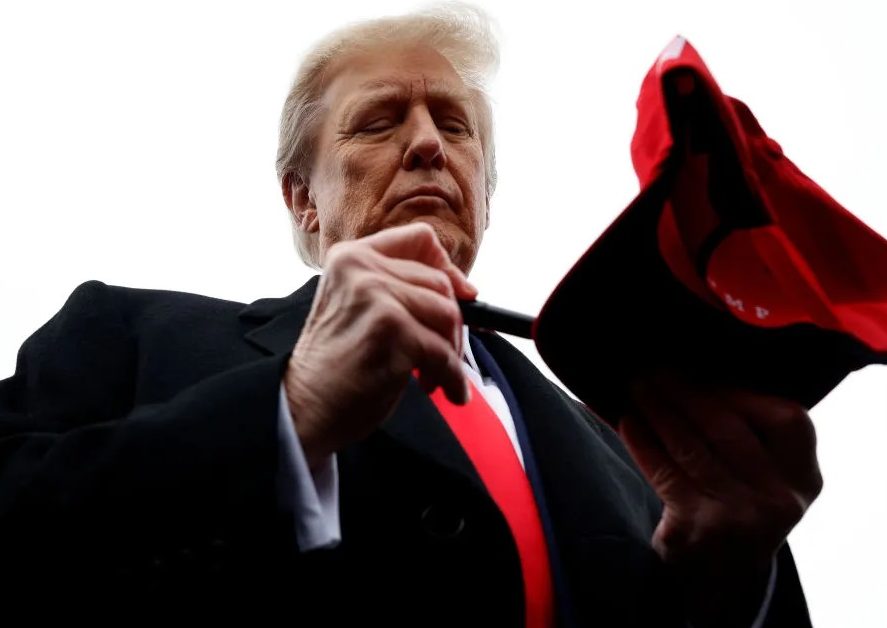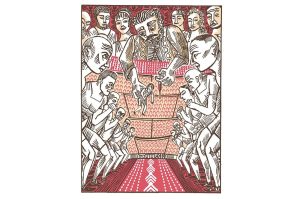With the exception of Hungary’s Viktor Orbán and Slovakia’s Robert Fico, it’s safe to assume that Europe is petrified about the prospects of a second Donald Trump presidency. As one European foreign policy analyst told the New York Times last summer: “It’s slightly terrifying, it’s fair to say.”
The terror meter went up a few notches this weekend, when Trump addressed supporters at a campaign rally and told a story (who knows if the story was actually true) about the time he told a European bigwig that the United States would not protect a European country from Russian invasion if it failed to meet NATO’s defense spending benchmark. “In fact,” Trump said, “I would encourage them to do whatever the hell they want.”
The reaction was swift, immediate and angry. The Biden administration blasted Trump’s comments as “appalling and unhinged.” The German Foreign Ministry, in a not-so-subtle brushback, reminded everybody with an X account that NATO keeps 950 million people safe from a possible Russian invasion. European Council President Charles Michel tweeted out something more forceful: “Reckless statements on #NATO’s security and Act 5 solidarity serve only Putin’s interest.”
You would get a lot of support for that statement in Washington, a town that hyperventilates after every Trump utterance. Indeed, lawmakers are so concerned about what Trump would do with NATO if he returned to the White House that they included a provision in the annual defense policy bill barring any future president from pulling the US out of the transatlantic alliance. The election is still nine months away but the foreign policy establishment on both sides of the Atlantic are doing what they can to prepare.
The Europeans are right to be nervous. But in a way, they only have themselves to blame. While Americans may not want the US to get out of NATO, they do find it objectionable that the US is doing most of the legwork in keeping Europe whole, free and at peace while the rest of the alliance — Britain, Poland and the Baltic states excluded — basically resembles a bunch of twenty-five-year-old couch potatoes sitting in their parents’ basement, taking indefinite support for granted. Sure, this analogy will make a lot of Europeans upset, but how else to describe a situation in which almost two-thirds of NATO members are still failing to meet NATO’s 2 percent of GDP metric nearly seventeen years after it was first established? To believe a continent with a $17 trillion GDP doesn’t have the financial resources to fulfill those obligations is ludicrous, and we shouldn’t pretend otherwise.
Trump creates binaries in the conversation, regardless of the issue at hand. His rant last weekend is no exception. One side is appalled by what he said, not only due to his incitement of a Russian invasion of European territory but also over his ignorance of how NATO actually works. The other side, largely supporters in the conservative media and former officials in his prior administration, insist that Trump’s toughness was the only reason NATO allies started getting at least a little serious about their own defense. As usual, both sides embellish their points for the sake posterity.
But believe it or not, this isn’t a black-and-white affair. There are zones of truth sprinkled underneath the outrage.
The outrage is pretty obvious: signaling to Russia that Europe is fair game undermines the strategy of deterrence that underlines NATO’s entire purpose. You don’t need to be reciting NATO gospel every day to understand this. If the goal of this rhetoric is to scare Europeans straight, well, that’s unlikely to work either. Trump’s words don’t often correlate to his policies; he had a ball jousting with fellow NATO allies during summits and thought about withdrawing the US from the alliance, yet ultimately presided over NATO’s expansion and even pondered setting up a large, permanent US military base in Poland. In other words, we shouldn’t assume as so many do that Trump would back up his words with action. Maybe he would, maybe he wouldn’t.
Yet Trump isn’t wrong to be ticked off about how NATO is working. He isn’t even the first US president to express disdain. In November 1959, ten years after NATO’s creation, then-president Dwight D. Eisenhower told one of his generals that European members were in essence playing the US for fools. A decade later, defense secretary Melvin Laird wrote to Richard Nixon that the US “has told its Allies for the past several years that they can and should take over a greater share of Europe’s direct defense.” Ditto Barack Obama, who bluntly told the Atlantic during a wide-ranging interview that “free riders aggravate me.” The subtext didn’t take much parsing: Europe has grown too dependent on the US military, making it comfortable and lethargic.
Whether or not Trump would withdraw from NATO, refuse to order US troops to fight Russia on behalf of Lithuania or thin out the US military presence in Europe are all hypotheticals, hinging on an election any of us would be foolish to predict. European policymakers, though, would be equally foolish to assume this highly favorable status quo will stand the test of time.
This article was originally published on The Spectator’s UK website.





















